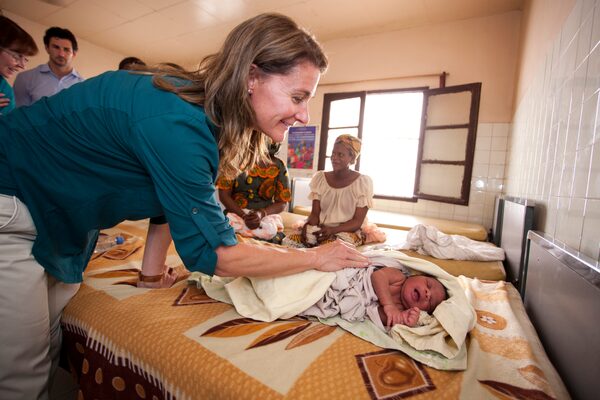
It had been two days since Notre-Dame burned, and already more than US$1-billion had been raised to rebuild it. A continent away from Paris, in Seattle, Melinda Gates sat down to talk about philanthropy, in her first Canadian interview about her new memoirs. If there’s anything Gates knows a lot about, it’s raising money for a cause. She is one of the richest women in the world, and as co-chair of the Bill and Melinda Gates Foundation, spends time among the poorest – or in privileged environments (her Seattle-area estate, her suite of offices, meeting world leaders) trying to help them.
In The Moment of Lift: How Empowering Women Changes the World, Gates shares some harrowing stories from her on-the-ground philanthropic work. A woman in India asks Gates to take her newborn and her two-year-old back home with her. It was her only hope for her children, the mother said, to get an education, to get enough food.
Elsewhere in India, she meets another woman with a horrific story. She was a sex worker; it was the only way she could support her daughter. When the girls’ schoolmates found out what her mother did for a living, they bullied her viciously. A few days later, the woman came home and found her daughter dead; she had killed herself.

Melinda Gates with Sudha Varghese during her walking tour of Kothwa village in Danapur, Bihar, India, in 2015.Prashant Panjiar
“These women were in agony,” Gates writes.
So, back to Notre-Dame’s billion dollars in pledges. I ask her whether it is frustrating to see people step up with their dollars and euros to help rebuild a church in a matter of hours, when millions of people are starving on our watch.
“I try not to judge, but of course when you see something that because it’s been top of the news and it’s tugged people’s hearts [attracts funds], and yet I know millions of children are dying in the developing world, it is frustrating,” Gates says, stressing that she – a practising Catholic – loves Notre-Dame and has many great memories of visiting the cathedral. “I think it’s just incredibly hard sometimes to connect with people who live in a different place, different world circumstances, or don’t look like you. And we need to do a better job of that.”

Gates, 54, now devotes much of her life to connecting with people who live in a different place and different world circumstances. Her husband, Microsoft co-founder Bill Gates, is the second-richest person in the world, according to Forbes, worth US$100-billion, give or take.Handout
Gates, 54, now devotes much of her life to that job. Her husband, Microsoft co-founder Bill Gates, is the second-richest person in the world, according to Forbes, worth US$100-billion, give or take. They have given billions to the Bill and Melinda Gates Foundation – the world’s wealthiest, with an endowment of more than US$50-billion.
Melinda Gates also founded Pivotal Ventures, an investment and incubation company focusing on U.S. women and families. We meet at Pivotal’s offices – also her executive office – on Lake Washington, not far from the mansion where the couple lives. The lobby houses a range of on-message books – Louisa May Alcott’s Little Women, I Am Malala by Malala Yousafzai, What I Know for Sure by Oprah Winfrey.
The Moment of Lift is both a recounting of her philanthropic work and a complement to it. Gates wrote it, she says, as a call to action. (Her proceeds are being donated to charity.)
The book’s stories about the women she has met in Africa and Asia are interspersed with tales from Gates’s own life, including some of the hardships she has faced – in a previous abusive relationship, in her marriage, at work.

Gates takes great pains to let the reader know she is aware of her privilege and in no way equates the difficulties she has faced with the horrors experienced by the women she is trying to help.Frederic Courbet
It’s easy to sneer, and Gates knows that. She takes great pains to let the reader know she is aware of her privilege and in no way equates the difficulties she has faced with the horrors experienced by the women she is trying to help.
“I wanted people to understand that I’m a human being. Yes, I thank God I’m not in a village where there’s female genital cutting going on. But that we’re also the same in certain ways, and I’m trying to break down the barriers,” she says in the interview. “Break down the barriers and get [readers] to see who I am and what fuels me to do this work.”
She writes about feeling alone in her marriage after having her first child. And about feeling frustrated by the inequitable division of labour at home, prompting her husband to start driving their daughter to school twice a week. Soon, Melinda noticed a change at drop-off time: more dads. She asked one of the other mothers about it. “When we saw Bill driving, we went home and said to our husbands, ‘Bill Gates is driving his child to school; you can, too,’” she writes.
Gates received permission from her family to share these stories. Her husband provided many helpful notes, but suggested only a single word change, and it was in a description of someone else.
“He was fine with all the pieces about him. Even some things that you might say were a little tough for him to hear,” she says.
Writing the book made her feel “incredibly vulnerable,” says Gates, who describes herself as a very private person.

Gates is famously a perfectionist. If there is a hair out of place on the day we meet, I cannot detect it; her clothing is immaculate.Photographer: Frederic Courbet
She writes about an exercise at her company where staff anonymously wrote down things about their managers they would never say to them. Gates heard herself described as “Mary [expletive] Poppins – practically perfect in every way!” (In the book the expletive is spelled “F@$*ing” and while I use the actual word in the interview, she responds by saying “effing.”)
Gates is famously a perfectionist. If there is a hair out of place on the day we meet, I cannot detect it; her clothing (bright-blue, silky bolero jacket over a cream blouse, slacks and flats) is immaculate. She is carrying her favourite type of pen (Paper Mate) and a reusable water bottle. Everything is just-so in the lake-view conference room where we sit – the fire is on, a candle is lit, a large digital clock keeps time. She is articulate, personable and confident.
But she is in fact sloppy and messy in many areas of her life, she writes.
Like what? I ask.
“Oh my God. Where do you want to begin?” she says with a laugh.
“There are a million things where at the end of the day you wish you’d said something in a nicer way to somebody,” she says. She recounts a meeting from the previous day, minus specifics. She was frustrated that the person had not organized their thoughts, making it difficult for Gates to make important decisions, so she ended the meeting. “I didn’t yell at them, but still I could have done an even better job on that, having a little more grace in the moment,” she says.
“The way I give feedback to people I can be messy or mean sometimes and I don’t mean to be,” she adds. “That’s something I’ve worked on a lot.”

When I point out how scary it must be for someone to receive criticism from her, she acknowledges that wholeheartedly. She says she can sometimes hear nervous laughter as she approaches a meeting room where employees are expecting her.Prashant Panjiar
When I point out how scary it must be for someone to receive criticism from her, she acknowledges that wholeheartedly. She says she can sometimes hear nervous laughter as she approaches a meeting room where employees are expecting her.
“So I will go in and try and just say some silly joke. Or say some disaster that happened this morning like ‘Oh God, I spilled my coffee on my pants this morning; sorry I’m late, I just had to change them.’ Something that just sort of takes the temperature down in the room. … It’s not just me at times; it’s Bill and me. Can you imagine the nerves in the room?”
The couple began their work in global health focusing on vaccines. I ask how she feels about the anti-vaccination movement in the West.
“I’m actually optimistic that it will remind people of the importance of vaccines. … We haven’t grown up with polio, we haven’t grown up with smallpox, we haven’t grown up with measles. But when you start seeing children dying or in the intensive-care unit because parents have stopped vaccinating and they’re taking advantage of the herd immunity – or they think they are – this unfortunately will be a reminder.”
Gates says the current political environment in the United States makes fundraising for foreign aid more challenging. But she is heartened by the results of the midterm elections, in particular the number of women elected.
And in what feels like a well-prepared answer about Canada, she says she believes this country can be a leader when it comes to international aid and supporting women.

The previous week, she and her husband received the 2019 George W. Bush Medal for Distinguished Leadership “from Laura and George,” she says, before quickly correcting herself. “Former president George W. Bush and Laura.”Jason Bell/Pivotal Ventures
She praises former international development minister Marie-Claude Bibeau (now Agriculture Minister), current International Development Minister and Minister of the Status of Women Maryam Monsef, and Prime Minister Justin Trudeau for his foreign-aid policies and for calling himself a feminist. (We did not get into the Jody Wilson-Raybould controversy.)
“I’d love to see a lot more of that in the United States. To me, that’s what leadership looks like.”
The previous week, she and her husband received the 2019 George W. Bush Medal for Distinguished Leadership “from Laura and George,” she says, before quickly correcting herself. “Former president George W. Bush and Laura.” She tells a story from that event, meant to illustrate her humanness.
For the gala, she wore high heels and a gown. Stepping into the SUV that picked them up required some inelegant wardrobe adjustments. There were two foundation staffers in the vehicle. “And I’m like, ‘Everybody just look away,’” Gates recounts. “And I got in and they heard me have to heave myself up in the car. And we all laughed so much and they said, ‘Well, we’re so glad to know you’re just like the rest of us.’”
Expand your mind and build your reading list with the Books newsletter. Sign up today.
 Marsha Lederman
Marsha Lederman